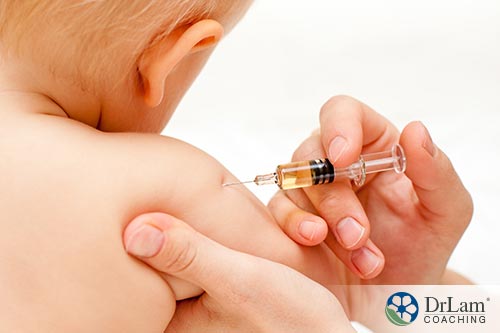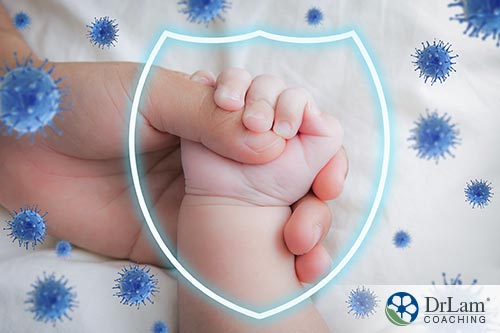 All children get the occasional bout of cold or flu, and there is not much you can do about it. Or is there? You see, nobody is born with perfect immunity, but if you know how to increase immunity in babies, you equip your child with the proverbial tools he needs to fight disease. You also ensure that you spend less time having to deal with your child’s health issues.
All children get the occasional bout of cold or flu, and there is not much you can do about it. Or is there? You see, nobody is born with perfect immunity, but if you know how to increase immunity in babies, you equip your child with the proverbial tools he needs to fight disease. You also ensure that you spend less time having to deal with your child’s health issues.
Before discussing how to increase immunity in babies, you first need to understand how your child’s immune system works. We will consider this before looking at what you can do to boost your child’s ability to fight off infections and other bacterial and viral conditions.
As an adult, your immune system is much more evolved and able to deal with viral or bacterial infections. This is because it has had years to build up antibodies that fight infection. Infection, as part of your body’s immune system response which, in turn, is part of your body’s NeuroEndoMetabolic (NEM) stress response is a natural, needed process to help ensure continued health.
When presented with stress, which could be a viral or bacterial attack on your body, your white blood cells respond, producing antibodies. These antibodies fight against the stressor to prevent us from getting ill.
But when the stress continues, and your body does not have the antibodies needed to fight against these attacks on our immune system, it causes a continued rise in your cortisol production. If this continues, it may lead to adrenal fatigue, which, in turn, together with the constant attack on your body by these outside stressors, may cause a variety of health issues. Constant bouts of cold or flu or two of these.
Your baby does not have the plethora of antibodies you, as an adult, have. This makes it so much easier for a baby to get sick. And if your little one cannot fight against the invaders; his health could take a serious decline with him constantly having the sniffles and you losing out on a lot of necessary sleep taking care of a sick child.
Your baby’s immune system starts developing during the last quarter of pregnancy, with antibodies passed to the child via the mother’s placenta. These much-needed antibodies allow your child to survive the birth process. But if you, as the mother, suffer from adrenal fatigue and a compromised immune system, the amount of immunity you pass on to your unborn child suffers. Therefore you, as a mother, need to ensure you are in particularly good health while pregnant with your unborn child.
But the birthing process also sees bacteria in the mother’s vagina passed on to your child. These bacteria ensure your baby’s gut becomes exposed to a large variety and quantity of bacteria that enhance his immunity. Furthermore, by breastfeeding your baby as soon as possible after the birthing process, you could further enhance his immune system. This is because your first milk, i.e. colostrum, is full of infection-fighting and immune-building antibodies.
 As a mother, any illness you have had has produced antibodies that you could pass on to your baby. But you would not have antibodies to diseases you never had. For example, if you had chickenpox at some stage, your body would have antibodies to this disease which you would pass on to your child, thereby giving him the ability to fight this condition. If, however, you never had chickenpox, your child would not have chickenpox antibodies.
As a mother, any illness you have had has produced antibodies that you could pass on to your baby. But you would not have antibodies to diseases you never had. For example, if you had chickenpox at some stage, your body would have antibodies to this disease which you would pass on to your child, thereby giving him the ability to fight this condition. If, however, you never had chickenpox, your child would not have chickenpox antibodies.
Furthermore, even if you breastfeed your baby, the antibodies you pass on only protect your child temporarily, He, or she needs to improve their immune system. And this process is a lifelong one. At 25 your immune system should be vastly superior to what it was when you were five years old, for example, due to your exposure to various viruses and bacteria over the years. This leaves us with the question: ‘how to increase immunity in babies?’
How to increase immunity in babies is not as difficult as one would think. By following a few easy-to-follow guidelines, you can increase your child’s immunity by providing immune system support and ensuring he has the tools his body needs to build up his antibodies to fight infections.
The most important thing you can do with regards to how to increase immunity in babies is to breastfeed your little one during the first few months. Your breastmilk contains all the fats, sugars, proteins, antibodies, and probiotics your little one needs during his first months to both help him grow and provide immune system support.
Studies show that breastfeeding your baby may help protect him against allergies, urinary tract infections, pneumonia, and diarrhea. It may also decrease his chances of sudden death infant syndrome. Furthermore, your breastmilk may improve his cognitive function and protect against certain health issues like diabetes type-1, colitis, and even certain cancers.
While antibiotics may sometimes be necessary, please take note that they may only prove effective against bacterial infections. They do not address issues resulting from viral infections.
Many new parents may try to pressure a healthcare professional into prescribing this type of medication. The other side of the coin is also true. Some healthcare professionals may prescribe antibiotics when not strictly necessary as a preventive measure.
Antibiotics may address bacterial health issues, but please remember that they also destroy good bacteria. And your baby needs good bacteria to support his immune health.
So, if in a position where your healthcare practitioner wants to give your baby antibiotics when the little one is ill, do ask him why they are necessary, whether natural options would work, and how the specific medication would affect your child’s immune system. Sometimes other alternatives may prove equally effective without causing gut disturbances.
 Yes, you can count supplements in your arsenal of tools on how to increase immunity in babies.
Yes, you can count supplements in your arsenal of tools on how to increase immunity in babies.
First off the bat are probiotics. Taking them while on a probiotic course will help preserve your baby’s gut health compositions. But expectant and new mothers could also reap the benefits of probiotics. If a mother takes probiotics during late pregnancy, she ensures some of these passes on to her unborn child. Lactating mothers would pass them on in their breastmilk.
You could also give your child a colostrum boost when older. This supplement is rich in antibodies and easily added to water, milk, or juice.
Adults who do not get enough sleep may become prone to depression. Babies who do not get enough sleep not only become irritable but become prone to different health issues. Getting enough sleep is one of the major ways of boosting your child’s boost system while promoting brain support. A newborn should ideally get between sixteen and eighteen hours of sleep within 24 hours.
So, the next time someone wants to pick up your baby to play when it is nap time, do not allow it. Set up your child’s sleeping times and stick to them. If people want to play with your baby let them wait until your child is a little older and needs less sleep time. And for tired parents, you also need your sleep. If your little one keeps waking during the night, do not feel bad about catching up by napping for an hour or two while your child sleeps during the day. Your body will thank you for it.
A healthy, balanced diet provides your baby with all the vitamins and nutrients he needs to grow up healthy and is probably the easiest way how to increase immunities in babies. Although your baby’s first foods seem bland, you would gradually introduce new foods until, by the time he is three years old, he eats everything the rest of the household does.
Good food choices for how to increase immunities in babies include probiotic-rich foods like unsweetened, plant-based yogurt mixed with pureed fruit, for example. And as he gets older, introduce him to antioxidant-rich foods like leafy green vegetables and bone-building foods like bone broth made from chicken.
As a parent, you may feel the need to feed your baby treats on occasion. In this case, please do not give your baby sugary foods. Sugar alters the microbiome and can mess around with your baby’s gut bacteria. Rather opt for fruit. If you feel your child is missing out when other children get candy, look for sweets made from a natural sweetener like stevia.
Exercise is important for both your immune system as a parent and your child’s. While a baby, of course, you cannot expect your child to exercise. But as he grows older, encourage him to crawl, and later walk around both in and outside your home. Playing outside gives your child the freedom of natural exercise in the sunshine that provides his body with vitamin D. There is a close association between low vitamin D levels and various autoimmune disorders, including type-1 diabetes.
As he grows, consider taking bike rides, going on hikes, or taking him along while walking the dog. Of course, do encourage your older child to take up some sort of sport. The type of sport does not matter. It not only keeps your child fit and promotes heart health but also provides immune system support.
Good hygiene does not necessarily mean your child needs to live in a 100% sterile environment. Nor does it mean he needs to be bombarded by germs.
Good hygiene practices for a growing baby give him leeway to crawl on the floor and pet the dog. But it also means washing hands with soap and water afterward and before meals. Keeping a clean home is also necessary, but this does not mean every surface needs to be kept sterile 24/7. You need a balance.
A child growing up in a sterile environment is never exposed to new germs and won't build up antibodies. On the other hand, over-exposure to germs may overwhelm a developing immune system.
Never expose your baby to secondhand smoke. Cigarette smoke contains thousands of harmful chemicals. These chemicals could seriously affect his health because his Detoxification Circuit is not as developed as an adult’s. In babies, exposure to secondhand smoke could increase their risk of asthma, ear issues, and bronchitis and may also harm their neurological development.
If you are a parent and want to know how to increase immunity in babies, here are a few things you can do.

If considering the use of supplements either for you while lactating or breastfeeding, or for your baby, please do so with the guidance of a healthcare practitioner. They will assess their benefits and recommend the correct doses.
If you would like to know about how to increase immunity in babies, the team at Dr. Lam Coaching can help. We offer a free** no-obligation phone consultation at +1-626-571-1234 where we privately discuss your issue. You can also send us a question through our Ask The Doctor system by clicking here.
There are many tools a parent can use as it pertains to how to increase immunity in babies naturally. It starts with breastfeeding but goes on to making the correct lifestyle choices and ensuring his diet is geared towards ensuring optimal health.
